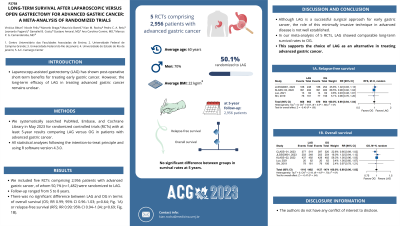Monday Poster Session
Category: Stomach
P2758 - Long-Term Survival After Laparoscopic vs Open Gastrectomy for Advanced Gastric Cancer: A Systematic Review and Meta-Analysis of Randomized Trials
Monday, October 23, 2023
10:30 AM - 4:15 PM PT
Location: Exhibit Hall

Has Audio
- KR
Kian M. Rocha
Universidade do Estado do Rio de Janeiro
Rio de Janeiro, Rio de Janeiro, Brazil
Presenting Author(s)
Vinicius Bittar, 1, Nicole Felix, 2, Marcelo Antonio P.. Braga, 3, Mauricio Boneli, 1, Kian M.. Rocha, 3, Pedro C. A.. Reis, 3, Leonardo Fogaroli, 1, Gamaliel B. Costa, 4, Gustavo Amaral, MD1, Ana Carolina Comini, MD5, Marcos P. G.. Camandaroba, MD5
1Centro Universitário das Faculdades Associadas de Ensino - FAE, São João da Boa Vista, Sao Paulo, Brazil; 2Federal University of Campina Grande, Campina Grande, Paraiba, Brazil; 3Universidade Federal do Rio de Janeiro, Rio de Janeiro, Rio de Janeiro, Brazil; 4Centro Universitário das Faculdades Associadas de Ensino, São João da Boa Vista, Sao Paulo, Brazil; 5A. C. Camargo Cancer Center, São Paulo, Sao Paulo, Brazil
Introduction: Laparoscopy-assisted gastrectomy (LAG) has shown post-operative short-term benefits for treating early gastric cancer. However, the long-term efficacy of LAG in treating advanced gastric cancer remains unclear.
Methods: In accordance with PRISMA guidelines, we systematically searched PubMed, Embase, and Cochrane Library in May 2023 for randomized controlled trials (RCTs) with at least 5-year results comparing LAG versus open gastrectomy (OG) in patients with advanced gastric cancer. We performed all statistical analyses following the intention-to-treat principle and using R software version 4.3.0.
Results: We included five RCTs comprising 2,956 patients with advanced gastric cancer, of whom 50,1% (n=1,482) were randomized to LAG. Total follow-up ranged from 5 to 8 years. In the long-term follow-up, there were no significant differences between LAG and OG in terms of overall survival (OS; RR 0.99; 95% CI 0.96–1.03; p=0.64; I2=0%; Fig. 1A) or relapse-free survival (RFS; RR 0.99; 95% CI 0.94–1.04; p=0.69; I2=0%; Fig. 1B) in patients with advanced gastric cancer.
Discussion: In our meta-analysis of RCTs, LAG showed comparable long-term survival rates to OG. This reassures the efficacy of LAG as an alternative in treating advanced gastric cancer, as initially suggested by short-term RCTs.

Disclosures:
Vinicius Bittar, 1, Nicole Felix, 2, Marcelo Antonio P.. Braga, 3, Mauricio Boneli, 1, Kian M.. Rocha, 3, Pedro C. A.. Reis, 3, Leonardo Fogaroli, 1, Gamaliel B. Costa, 4, Gustavo Amaral, MD1, Ana Carolina Comini, MD5, Marcos P. G.. Camandaroba, MD5. P2758 - Long-Term Survival After Laparoscopic vs Open Gastrectomy for Advanced Gastric Cancer: A Systematic Review and Meta-Analysis of Randomized Trials, ACG 2023 Annual Scientific Meeting Abstracts. Vancouver, BC, Canada: American College of Gastroenterology.
1Centro Universitário das Faculdades Associadas de Ensino - FAE, São João da Boa Vista, Sao Paulo, Brazil; 2Federal University of Campina Grande, Campina Grande, Paraiba, Brazil; 3Universidade Federal do Rio de Janeiro, Rio de Janeiro, Rio de Janeiro, Brazil; 4Centro Universitário das Faculdades Associadas de Ensino, São João da Boa Vista, Sao Paulo, Brazil; 5A. C. Camargo Cancer Center, São Paulo, Sao Paulo, Brazil
Introduction: Laparoscopy-assisted gastrectomy (LAG) has shown post-operative short-term benefits for treating early gastric cancer. However, the long-term efficacy of LAG in treating advanced gastric cancer remains unclear.
Methods: In accordance with PRISMA guidelines, we systematically searched PubMed, Embase, and Cochrane Library in May 2023 for randomized controlled trials (RCTs) with at least 5-year results comparing LAG versus open gastrectomy (OG) in patients with advanced gastric cancer. We performed all statistical analyses following the intention-to-treat principle and using R software version 4.3.0.
Results: We included five RCTs comprising 2,956 patients with advanced gastric cancer, of whom 50,1% (n=1,482) were randomized to LAG. Total follow-up ranged from 5 to 8 years. In the long-term follow-up, there were no significant differences between LAG and OG in terms of overall survival (OS; RR 0.99; 95% CI 0.96–1.03; p=0.64; I2=0%; Fig. 1A) or relapse-free survival (RFS; RR 0.99; 95% CI 0.94–1.04; p=0.69; I2=0%; Fig. 1B) in patients with advanced gastric cancer.
Discussion: In our meta-analysis of RCTs, LAG showed comparable long-term survival rates to OG. This reassures the efficacy of LAG as an alternative in treating advanced gastric cancer, as initially suggested by short-term RCTs.

Figure: There is no significant difference between the groups in terms of A) Overall 5-year survival and B) Relapse-free 5-year survival
Disclosures:
Vinicius Bittar indicated no relevant financial relationships.
Nicole Felix indicated no relevant financial relationships.
Marcelo Antonio Braga indicated no relevant financial relationships.
Mauricio Boneli indicated no relevant financial relationships.
Kian Rocha indicated no relevant financial relationships.
Pedro Reis indicated no relevant financial relationships.
Leonardo Fogaroli indicated no relevant financial relationships.
Gamaliel Costa indicated no relevant financial relationships.
Gustavo Amaral indicated no relevant financial relationships.
Ana Carolina Comini indicated no relevant financial relationships.
Marcos Camandaroba indicated no relevant financial relationships.
Vinicius Bittar, 1, Nicole Felix, 2, Marcelo Antonio P.. Braga, 3, Mauricio Boneli, 1, Kian M.. Rocha, 3, Pedro C. A.. Reis, 3, Leonardo Fogaroli, 1, Gamaliel B. Costa, 4, Gustavo Amaral, MD1, Ana Carolina Comini, MD5, Marcos P. G.. Camandaroba, MD5. P2758 - Long-Term Survival After Laparoscopic vs Open Gastrectomy for Advanced Gastric Cancer: A Systematic Review and Meta-Analysis of Randomized Trials, ACG 2023 Annual Scientific Meeting Abstracts. Vancouver, BC, Canada: American College of Gastroenterology.
